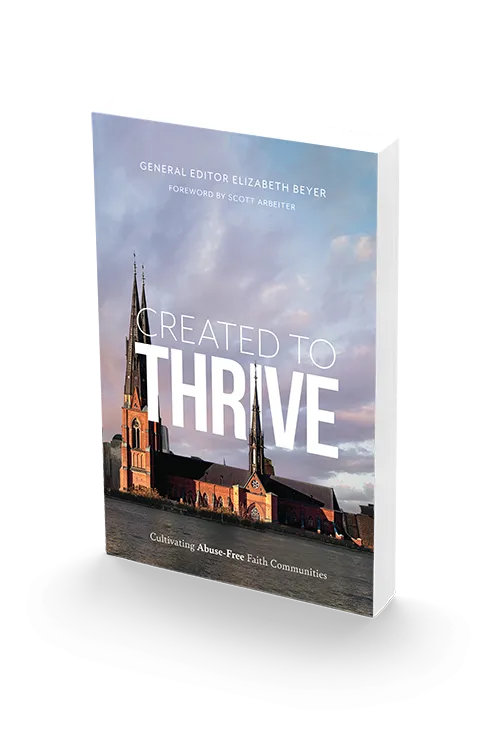When I was a graduate student navigating a new culture, distanced from family and friends, I found comfort at a local rose garden. Sniffing the roses, one by one, their scent and delicate petals evoked my mother’s nearness and love. As I studied the mother metaphors of God in Scripture, I began to see the crucial way mothers can and often do reflect God’s attributes.
Scripture offers a rich variety of images, names, and metaphors for God, including those knowable only through mothers. Isaiah 66:13 observes, “As a mother comforts her child, so will I comfort you.” In Hosea 11:3–4, God says, “It was I who taught Ephraim to walk, taking them by the arms . . . To them I was like one who lifts a little child to the cheek, and I bent down to feed them.”
Revealing God in ways we understand, through our experiences with and as mothers, we discern God’s nearness, fierce protection, and daily nurturing. Making visible God’s motherly attributes was consistently part of the church’s teaching and is not a modern invention. Consider the following examples:
Clement of Alexandria (150–215) recognized that “God is love; and out of love to us became feminine…in his compassion to us he became mother.”1
Augustine (354–430) said motherhood reflects God’s tender nurture. He wrote, “He who has promised us heavenly food has nourished us on milk, having recourse to a mother’s tenderness.”2
For Gregory of Nyssa (335–395), mothers image the nearness of God, who would otherwise be distant and inaccessible. Like a “tender mother who joins in the inarticulate utterances of her babe, gives to our human nature what it is capable of receiving; and thus in the various manifestations of God to humanity, God both adapts to humanity and speaks in human language.”3
Without apology, the church used breast and womb metaphors for God’s closeness and fierce loving nurture.
Teresa of Avila (1515–82) wrote, “For from those divine breasts where it seems God is always sustaining the soul, there flow streams of milk bringing comfort to all the people.”4
Anselm (1033–1109) said that Jesus was not only a tender-loving mother, Christ’s death and resurrection are the spiritual womb of our rebirth. He writes: “And you, Jesus, are you not also a mother? … It is by your death that they have been born, for if you had not been in labour . . . and if you had not died, you would not have brought forth. . .”5 Run “under the wings of Jesus your mother and lament your griefs under his feathers . . . by your gentleness the badly frightened are comforted, by your sweet smell the despairing are revived, your warmth gives life to
the dead.”6
Like the sweet-smelling roses that evoked my mother’s comfort, her fierce love mirrors Christ’s motherly protection. Though God is neither male nor female, we humans need daily metaphors to know God through familial experiences. Mothers provide us with a sensible understanding of God’s nearness in all of life, especially during stress. John Chrysostom (347–407) said that Christ, like a mother, gives birth to a new race through great pain and bodily sacrifice. Christ nurtures us as mother with his body and blood. As a mother he births and nurses each of us as God’s child.7 This is a universal image of intimate care knowable through the example of mothers. Thanks be to God.
This article is from “Motherhood,” the Spring 2022 issue of Mutuality magazine. Read the full issue here.
Notes
- Clement of Alexandria, trans. G.W. Butterworth (Cambridge, Massachusetts: Harvard University Press, 1953), 347, as quoted by Jennifer Heimmel in “God Is Our Mother”: Julian of Norwich and the Medieval Image of Christian Feminine Divinity (Salzburg, Austria: Institute for Anglistick Und Amerikanistik, 1982), 14–15.
- Augustine, St. Augustine on the Psalms, trans. Dame Scholastica Hebgin and Dame Felicitas Corrigan, Ancient Christian Writers Series, no. 30, eds. Johannes Quasten and Walter J. Burghardt (Westminster, Maryland: The Newman Press, 1961), II, 20–21., quoted in Heimmel, “God Is Our Mother,” 21.
- Kenton L. Sparks, God’s Word in Human Words: An Evangelical Appropriation of Critical Biblical Scholarship (Grand Rapids, MI: Baker Academic, 2008), 238.
- Teresa of Avila, The Interior Castle, trans. K. Kavanaugh and O. Rodriquez (New York: Paulist, 1979), 179–80.
- Anselm, The Prayers and Meditations of Anselm, 19, quoted in Heimmel, “God Is Our Mother,” 153–54.
- Heimmel, “God Is Our Mother,” 155–56.
- Chrysostom, 495–96, quoted in Heimmel, “God Is Our Mother,” 18–19.





